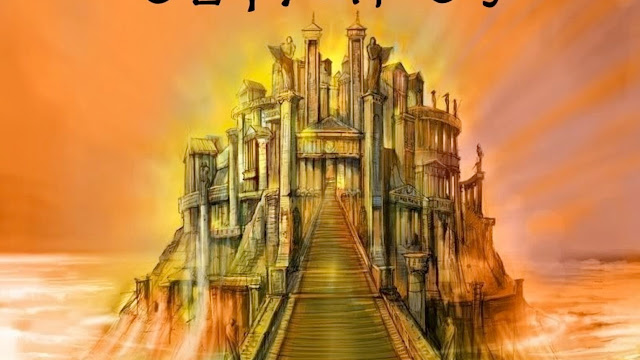Mount Olympus is the mythical home of the gods in Greek mythology. According to authors, the mountain was created after the Titanomachy, the epic battle between the young gods, the Olympians and the older gods, the Titans. As a result of this battle, the Olympian victors created their new majestic home – Mount Olympus. It was shrouded from human eyes by clouds which constantly obscured its peaks. In Greece, you will also find a Mount Olympus, the tallest mountain in the country.
The sacred mount was believed to have a temperate climate all year round, and mountain gorges lush with forests. The gods did not always reside in their paradise, however, and would depart or return from there via a gate of clouds guarded by the Horae, the goddesses of the seasons. Authors claim the tables in Zeus’ palace on Olympus were made of gold and were actually automatons, created by Hephaestus! They moved in and out of the rooms as required by the gods. Zeus’ throne was situated in the Pantheon, the meeting hall of the gods. It was also designed by Hephaestus and was constructed from black marble, inlaid with gold. Each of the gods had their own palace on the mountain, usually constructed of gold and marble, and situated in a gorge in the mountain peaks.
All 12 Olympian gods resided at Mount Olympus: Zeus and his wife Hera, Athena, Poseidon, Artemis, Apollo, Demeter, Hester, Aphrodite, Hermes, Hephaestus and Ares. Since Hades resided in the underworld, he was not considered an Olympian god and did not visit the great mount often.
The nine muses, the daughters of Mnemosyne and Zeus, resided at the foot of the mountain. According to some sources, the goddesses were water nymphs and were responsible for the following: Clio – history; Calliope – epic poetry; Thalia – comedy; Euterpe – lyric poetry; Terpsichore – dance; Melpomene – tragedy; Erato – love poetry; Urania – astronomy; and Polyhymnia – sacred poetry.
The Olympians ruled Olympus until the monster Typhon attacked their stronghold. Typhon was allegedly a 100-headed fire-breathing dragon. When he attacked Olympus, the majority of the gods chose to flee, except for Zeus, Athena and Dionysus. Zeus was able to eventually defeat the giant monster with 100 lightning bolts, and banished him to Tartarus.
The gods met daily at Zeus’ palace in the Pantheon, where they held feasts and discussed the fate of the mortals. There, they drank nectar and ate ambrosia, which perpetuated their immortality. Allegedly, when the gods drank ambrosia, the blood in their veins was replaced by ichor, a substance toxic to humans. Ichor also ran through the veins of Talos, the Greek giant automaton.
The sacred mount was believed to have a temperate climate all year round, and mountain gorges lush with forests. The gods did not always reside in their paradise, however, and would depart or return from there via a gate of clouds guarded by the Horae, the goddesses of the seasons. Authors claim the tables in Zeus’ palace on Olympus were made of gold and were actually automatons, created by Hephaestus! They moved in and out of the rooms as required by the gods. Zeus’ throne was situated in the Pantheon, the meeting hall of the gods. It was also designed by Hephaestus and was constructed from black marble, inlaid with gold. Each of the gods had their own palace on the mountain, usually constructed of gold and marble, and situated in a gorge in the mountain peaks.
All 12 Olympian gods resided at Mount Olympus: Zeus and his wife Hera, Athena, Poseidon, Artemis, Apollo, Demeter, Hester, Aphrodite, Hermes, Hephaestus and Ares. Since Hades resided in the underworld, he was not considered an Olympian god and did not visit the great mount often.
The nine muses, the daughters of Mnemosyne and Zeus, resided at the foot of the mountain. According to some sources, the goddesses were water nymphs and were responsible for the following: Clio – history; Calliope – epic poetry; Thalia – comedy; Euterpe – lyric poetry; Terpsichore – dance; Melpomene – tragedy; Erato – love poetry; Urania – astronomy; and Polyhymnia – sacred poetry.
The Olympians ruled Olympus until the monster Typhon attacked their stronghold. Typhon was allegedly a 100-headed fire-breathing dragon. When he attacked Olympus, the majority of the gods chose to flee, except for Zeus, Athena and Dionysus. Zeus was able to eventually defeat the giant monster with 100 lightning bolts, and banished him to Tartarus.
The gods met daily at Zeus’ palace in the Pantheon, where they held feasts and discussed the fate of the mortals. There, they drank nectar and ate ambrosia, which perpetuated their immortality. Allegedly, when the gods drank ambrosia, the blood in their veins was replaced by ichor, a substance toxic to humans. Ichor also ran through the veins of Talos, the Greek giant automaton.

Comments
Post a Comment